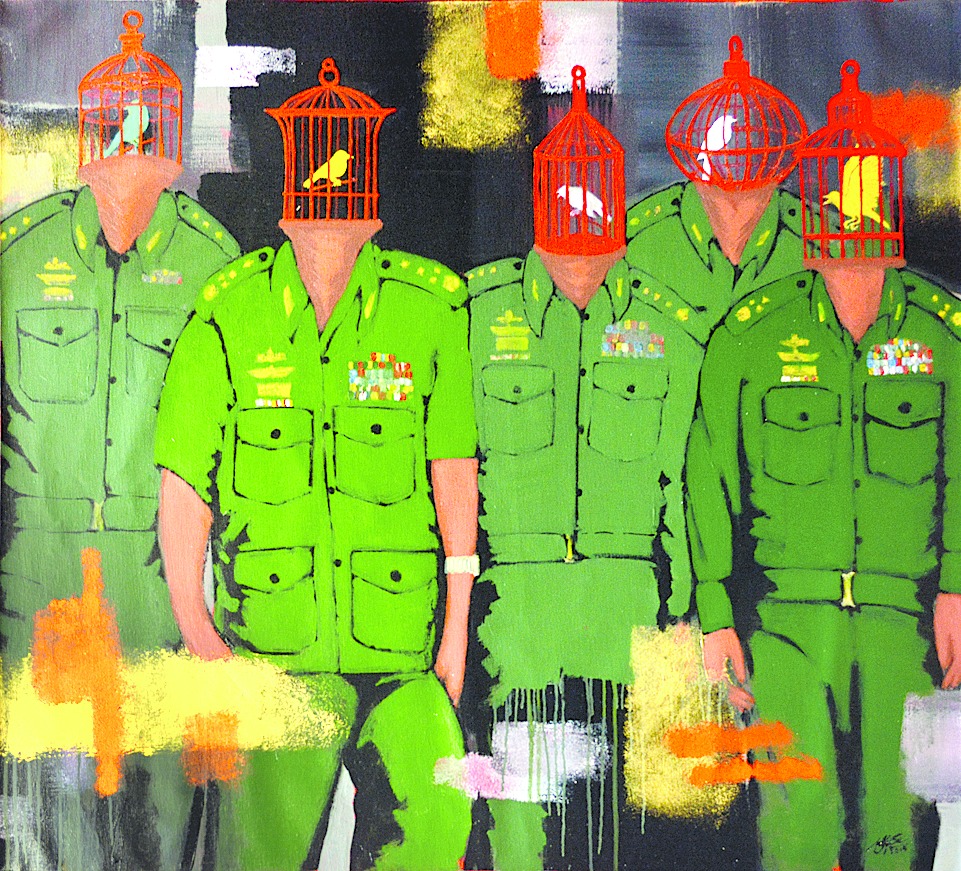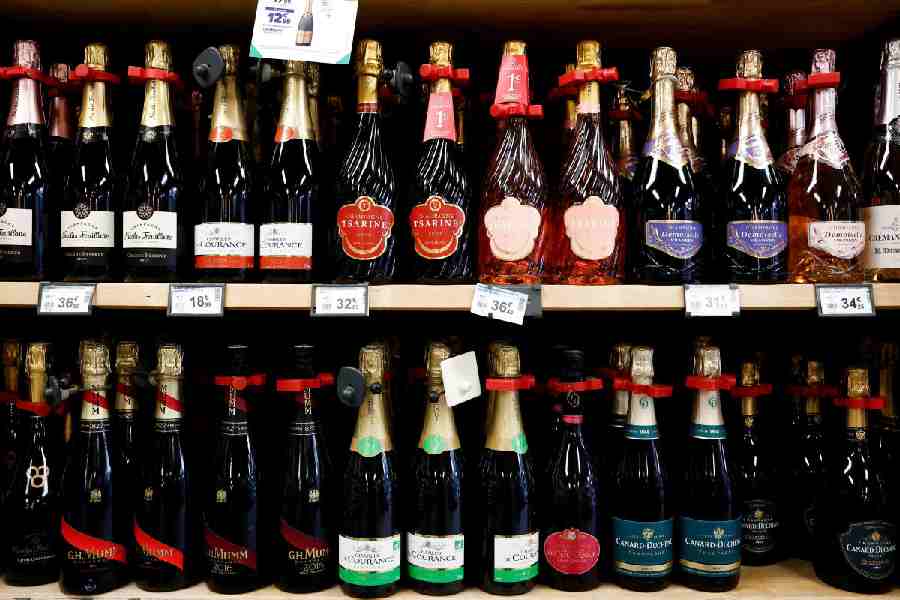
The painting is stark. Military men - dressed in olive green - stand in a row. Their heads are covered with bird cages. The work by Aung Kyi Soe, in the Blind in Knowledge series, is called Cages and is on display at an art gallery in Yangon, once called Rangoon.
Young musicians strum their guitars and sing at a club. The lyrics are simple - "We hate the system," they chant.
A local news website displays a cartoon called "Religion and Elections". Two sumo wrestlers are fighting each other.
As Myanmar goes to the polls today to elect a new government after five decades of military dictatorship, there is talk of change in the air. Changes are taking place not just in the political milieu but in the country's art and culture field, too. Liberal voices once muzzled by the junta are slowly regaining their pitch. And painters, musicians, cartoonists, filmmakers are all a part of the transition.
"We are taking baby steps to democracy through art," says artist and curator Pyay Way, whose Nawaday Tharlar Art Gallery is displaying the Blind Knowledge painting.
Way, who opened the art gallery in Yangon's busy Dagon Township in 2012, says that he always wanted to create a liberal space for artists. "My artist friends felt suffocated not being able to express themselves," he says.
Now there are at least 10 new art galleries in Yangon. Way's gallery is also open to poets, singers and dancers. He organises an "open mic" evening once or twice a month where people express their concerns.
"There is a vibrant art community producing strong work in a variety of styles and formats, despite years of isolation and a limited domestic market for art," points out historian and curator Melissa Carlson, who displayed the works of Myanmar's artists at two exhibitions - Burma by Proxy: Art at the Dawn of Democracy (2015) and Banned in Burma: Painting under Censorship (2014) in Hong Kong.
Myanmar has been witnessing significant changes since 2010, when National League for Democracy (NLD) leader Aung San Suu Kyi was released after two decades of house arrest. The military government headed by President Thein Sein released more than 200 political prisoners. Regressive laws which prevented assembly of more than five people were repealed.
The spurt in art and culture followed changes in censorship laws and as the government allowed access to the Internet. Till 2012, all videos, both feature and documentary, had to go through the video Censor Board of the Television and Video Act, 1996, before distribution and screening. Failure to comply could result in fines, imprisonment of up to three years and confiscation of property. The rules of censorship have now been relaxed.

Cinema critical of the junta is no longer rare. An 18-minute short film Ban That Scene by Htun Zaw Win, for instance, criticises censorship. Pyae Zaw Phyo's 12-minute documentary film Enter on the life of a political prisoner in Myanmar exposes political abuse. "It shows how the government tortured political prisoners in jail," Phyo says.
Since 2013, the Human Rights Human Dignity International Film Festival has been organised in Myanmar in a bid to prod young filmmakers into making meaningful cinema. "This film festival is an effort to create a democratic space," says the festival organiser Min Htin Ko Ko Gyi, who won the best documentary award at a 2010 film festival in Hanoi for his film The Floating Tomatoes.
It's not just motion pictures - cartoons are coming alive, too. Satirical lines touch upon a vast spectrum of subjects once considered taboo, from child soldiers and military politics to Buddhist militancy.
Cartoonist Beruma put up a sketch that showed General Than Shwe, Myanmar's former dictator, controlling Thein Sein. A cartoon by artist Aw Pi Kyeh makes a telling comment about the political situation in the southeast Asian country, where military men are seeking to join the electoral process. A footballer has been substituted on the field - but instead of a new player coming in, he returns in another uniform.
"There is a space for political cartoons in local news journals," says cartoonist Kyaw Thu Yein, who does political cartoons for a satirical website, Cartoon Movement. "I started cartoons in 2000. But my cartoons then were not published in newspapers except for a local humour magazine."
For many artists, the whiffs of freedom are heady. They remember the time when few artistes could raise their voice against the rulers of Myanmar. Celebrated painter Aye Ko was arrested for speaking out against military repression. After a year in jail, he joined a shoe business. And it was only much later that he returned to art.
Artists were not allowed to display their work against the government in the galleries. Political art was banned, as was nudity. Even excessive use of black, white and red was censored.

Music came under restrictions, too. Punk bands were not allowed to perform in concerts without taking prior permission from the government's Censor Board. Rock bands had to submit their lyrics to the government before they could even be cleared for performance or recording. Many performed secretly in warehouses and railroad yards. Rock bands such as Side Effect, Broken Order, No U Turn, and Rebel Riot performed in underground clubs, and sang of abuse of power by the military.
"We were expected to sing only good songs, about the natural beauty of the country and about love. They wanted us to shut our eyes to reality," says Darko C., vocalist and guitarist of Side Effect.
The band was set up in 2004 but couldn't release an album till 2012, when censorship rules were relaxed. Even then, there were restrictions. He had to drop a song on prostitution from their first album, Rainy Night Dreams.
Darko is now all set to release a new album called Voice of the Youth, where he urges the young to be agents of change.
Artistes, however, rue that they are still censored. The pro-government Myanmar Music Association has replaced the Censor Board to exercise control over rock bands. Laws such as the Electronics Transaction Law, with a jail term of 15 years for anyone using "electronic technology that threatens the security of the State", still exist.
Last year, several paintings featuring nudes by artist Sandar Khine were removed from Yangon's Lokanat Galleries. Even now, art galleries have to take permission from the government before displaying their work.
Increasingly, though, artistes are violating the rules. "I have been threatened by security forces a couple of times for not taking permission," Way says. "Intelligence officials always keep a tab on our work," adds Ole Chavannes, a media trainer who works with the anti-government news website Democratic Voice of Burma.
But many are hopeful that today's elections will usher in a new climate. "What is the point of having an election if no change takes place on the ground," Way asks. "Suu Kyi should come to power to bring about that change."











